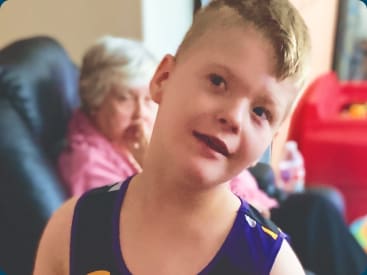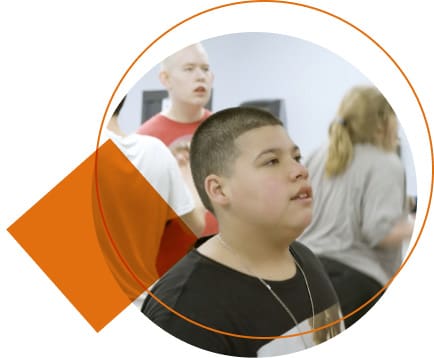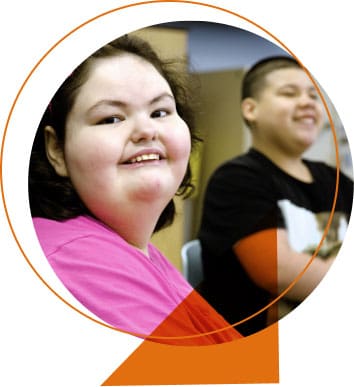
A weight loss and behavioral management program for children with Prader-Willi Syndrome and other weight-related disorders
Search no further for inpatient obesity treatment
Young people with established weight control problems, including Prader-Willi Syndrome, face significant obstacles that often impact all aspects of life. The excessive weight gain, food-seeking tendencies, challenging behaviors, and learning difficulties associated with PWS and other conditions can leave children and caregivers feeling overwhelmed.
In the Jump Start Program, we offer a structured, inpatient environment in which children receive the medical care, support, and guidance they need to reach weight loss and overall health goals. Using evidence-based medicine and recognized outcome measurement tools, we address both behavioral and medical needs. Nexus helps children live more active, healthy lives, because we’re passionate about mending minds.
Changing lives with remarkable outcomes
1,416 total pounds lost in 2023
Improved eating habits
16.4% average BMI decrease for discharged patients
Enhanced self-confidence and recognition of personal strengths & abilities
Strengthened peer connections
Check out the following video to learn more about Nexus’ Jump Start Program.
Treating obesity, weight-related medical complications and behavioral challenges
Children with established weight control problems, including childhood obesity and PWS, and weight-related medical conditions often need a safe, structured environment to help them reach weight loss and general health goals.
Program features:
- Individualized treatment plans that address medical issues and behavioral complications
- Master treatment team meetings held once a week to review patient goals and progress
- Physical, occupational, and speech therapy
- Recreational, music, art, and pet therapy
- Specialized Schroth Method scoliosis intervention
- Local certified teacher providing on-campus education four days per week
- Emotional and social support for individuals and families
- Designed for all individuals who have found traditional outpatient programs unsuccessful
Offering a welcoming, home-like setting, the Jump Start Program helps patients decrease BMI while addressing co-occurring medical conditions.
Program goals:
- Decrease body mass index (BMI)
- Increase physical mobility
- Resolve weight-related conditions
- Develop strategies to manage behavior
- Decrease unstructured time
- Develop coping skills for at home, school, or in the community
- Improve overall quality of life*
*The continued support and structure provided by family members, caregivers, and friends is imperative to the ongoing success of PWS management

Meet a Jump Start Program success story
“Nexus helped tremendously with the weight loss. They put Kale on an amazing diet plan that we still follow at home today. Nexus also assisted him with becoming more stable and mobile through physical and occupational therapy.”
— Danika, patient’s mother
The only nationally recognized weight loss program for children with PWS
During their stay, patients adjust to personalized calorie-controlled diets, learn how to set schedules, and develop physiological and emotional strength through physical, occupational, speech, recreational, music, and pet-based therapies. Through daily practice, evidence-based guidance from medical professionals, and peer support, patients learn principles of healthy living that can be applied at home.
Diagnosis Criteria
- Individual with PWS*
- Body mass index (BMI) greater than 35
- At least 2 comorbidities
- Other rare genetic disorders
*Patients with a PWS diagnosis do not have to meet other criteria upon admission

Common Comorbid Conditions
- Type II diabetes and associated complications
- Hypertension and heart disease
- Obstructive sleep apnea (OSA)
- Fatty liver
- Obesity hypoventilation syndrome
- Intertrigo (skin breakdown, yeast, and bacterial infections in deep fat folds)
- Leg edema
- Mobility issues
- Cellulitis
- Venous stasis disease with risk of thrombotic events
What is Prader-Willi Syndrome?
PWS is a rare genetic disorder that affects learning and behavior resulting from an abnormality on the 15th chromosome. People with this genetic condition experience delayed or deficient satiation cues, causing them to overeat. To complicate matters further, those with PWS have unusually low caloric needs. The combination of these symptoms can lead to life-threatening conditions such as catastrophic obesity and stomach rupture, as well as maladaptive behaviors.
In pursuit of the feeling of fullness, individuals often develop powerful food-seeking habits. Some forage for food, consuming inedible products — such as raw, frozen, or spoiled food — out of desperation. Others place unauthorized delivery orders or strike out in search of restaurants. As this behavior escalates, individuals often resort to lying and stealing, sometimes breaking into neighbors’ houses or picking locks on kitchen cabinets. At the same time, caregivers may overestimate the individual’s caloric needs and unknowingly contribute to overeating.
Due to the rarity of the condition (affecting roughly 1 in 10,000 to 30,000 people worldwide1), robust programs that address both the medical and behavioral aspects of PWS are difficult to find. Jump Start is the only nationally recognized inpatient program offering comprehensive care for people with weight-related conditions such as PWS.
Challenges associated with PWS:
-
Life-threatening childhood obesity
-
Pulmonary issues, from obstructive sleep apnea to intubation secondary to obesity
-
Medical complications such as type 2 diabetes, decreased growth hormone, fatty liver, and bowel obstruction
-
Dermatillomania, or skin picking
-
Orthopedic issues including scoliosis, hip dysplasia, osteoporosis, and poor tone and balance
-
Cognitive impairments, intellectual disabilities, and low IQs
-
Severe behavior dysregulation associated with food seeking
